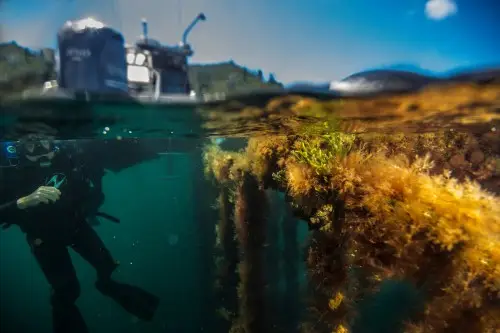Ask a question or call 0800 422 733
Sustainable Aquaculture (Level 3)
-
Tahatū, Career Navigator
Discover career possibilities and how to reach your goals. tahatu.govt.nz(external link)
-
Locations and dates
No start dates are currently available. Register to be informed when new dates are added. -
Study options
Part time only
-
Length
Part-time: One year online with workshop in October
-
Total credits
50
-
Fees
2026: $3,270 plus $146 Student Services Fee
A Student Service Fee applies (2026; $2.50 per credit).
Fees listed are for each year of the programme, indicative only and may vary with course selection.
View course details for individual fees. -
National qualification code
NZ3135
Start your aquaculture journey from anywhere in Aotearoa with NMIT’s flexible online qualification designed to prepare you for work or further study in this fast-growing industry.

Aquaculture is the breeding, rearing, and harvesting of fish, shellfish, plants, algae and other organisms in all types of water environments. It is the world’s fastest-growing primary sector, which means there’s high demand for skilled workers.
If you’re interested in an innovative industry that helps feed the world and supports healthier water ecosystems, this introductory qualification is a great place to begin.
This course will cover the fundamentals of sustainable aquaculture systems, hatchery management, and fish farming. As a graduate, you will be prepared to continue into further study, leading to a range of exciting jobs at aquaculture farms, vessels, hatcheries, or within research organisations.
Although the study is primarily online, you’ll come together with tutors and peers for a two-week practical workshop in Nelson. During this workshop, you will:
-
Gain hands-on experience operating NMIT’s Recirculating Aquaculture System (RAS)
-
Carry out water quality testing
-
Take part in field trips to local aquaculture sites
-
Spend time onsite with industry professionals
-
Have the opportunity to work at NMIT’s saltwater facility at the Cawthron Aquaculture Park
Because the programme is online, you can study from anywhere in New Zealand, fitting learning around work, whānau, or life commitments - while still accessing NMIT’s industry connections and practical learning opportunities.



